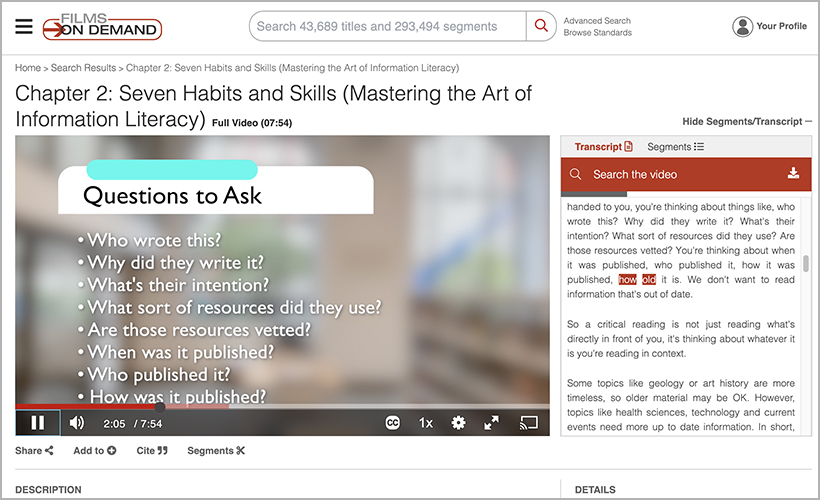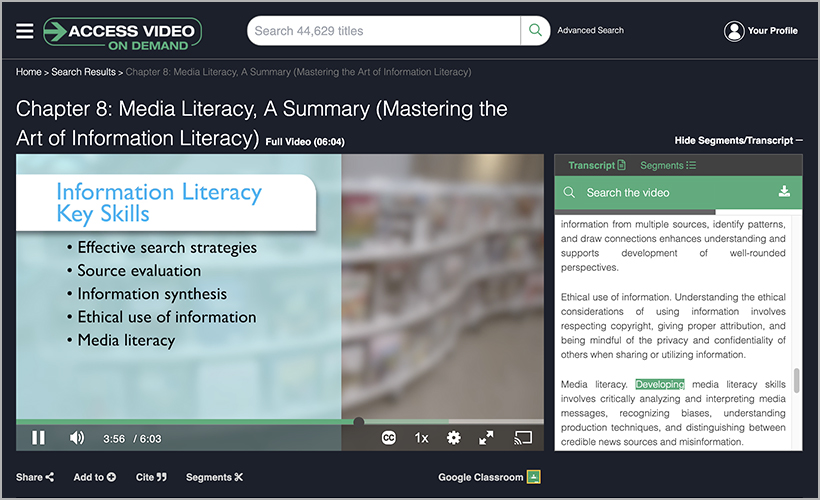Master Information Literacy with Our New Video Series

In this era of widespread misinformation and disinformation, the importance of incorporating information literacy into education cannot be overstated. Students and patrons need to be equipped with research skills if they are going to be able to manage today’s information glut.
If you’re looking for a resource that can help teach how to evaluate and fact-check sources, avoid plagiarism, use sound search strategies, and more, we have an essential video series for you: Mastering the Art of Information Literacy (2023) from Motion Masters.
Available exclusively from Films On Demand for colleges and universities, Learn360 for K–12 schools and districts, and Access Video On Demand for public libraries, this eight-part series teaches students how to review information presented and become masters at evaluating information in books, online, in the news, and information generated by AI.
Watch the video below to learn more about this important, exclusive video series.
Mastering the Art of Information Literacy Episodes
Introduction to Information Literacy (Item #291370)
What is information literacy and why is it important? This video introduces information literacy and its benefits, discussing the dangers of information illiteracy and the spread of misinformation. It cautions against information generated by AI.
Seven Habits and Skills (Item #291371)

This program presents seven habits and skills for improving one’s information literacy. It discusses finding your information needs, developing search strategies, evaluating sources, analyzing information, considering information, using information ethically, and practicing.
Evaluating Information Sources (Item #291372)
This program examines ways to know if a source is credible by looking at authorship and expertise, the publisher or platform, objectivity and bias, citations and references, and timeliness and currency of the information. It also presents tips for evaluating online sources by checking domain and URL, extensions, cross-referencing, and exercising caution with user-generated content.
Effective Search Strategies (Item #291373)
Discussing how Boolean operators work, this program teaches search techniques for refining online searches. It also considers phrase, date range, file type, language, site-specific, numeric range, related terms, and advanced image searches.
Fact Checking and Verifying (Item #291374)

False or misleading information can easily be mistaken for truth, so the importance of fact checking and verifying cannot be overstated. This program teaches practical strategies for verifying information. It discusses cross-referencing using multiple sources, investigating sources, checking primary sources, using fact-checking websites, assessing supporting evidence, and evaluating bias and objectivity. It also looks at how to identify fake or manipulated photos and videos.
Ethical Use of Information (Item #291375)
Emphasizing the importance of using information in a way that is fair, honest, and shows respect for others, this program discusses aspects of copyright, plagiarism (including self-plagiarism), fair use, and privacy of information.
Media Literacy (Item #291376)
How do you know if something is fake news? This program emphasizes the value of developing your critical-thinking skills. It looks at source evaluation, media bias, political bias, ideological bias, corporate bias, sensationalism, and confirmation bias. It discusses how to use fact-checking sites, considers critical analysis of news media and deconstruction of messages, and looks at media manipulation.
Media Literacy, a Summary (Item #291377)

This program emphasizes that information literacy is not just about knowing where to find information; it’s about knowing how to evaluate, analyze, and use that information effectively and responsibly. It reviews the importance of critical thinking and building one’s media literacy skills.